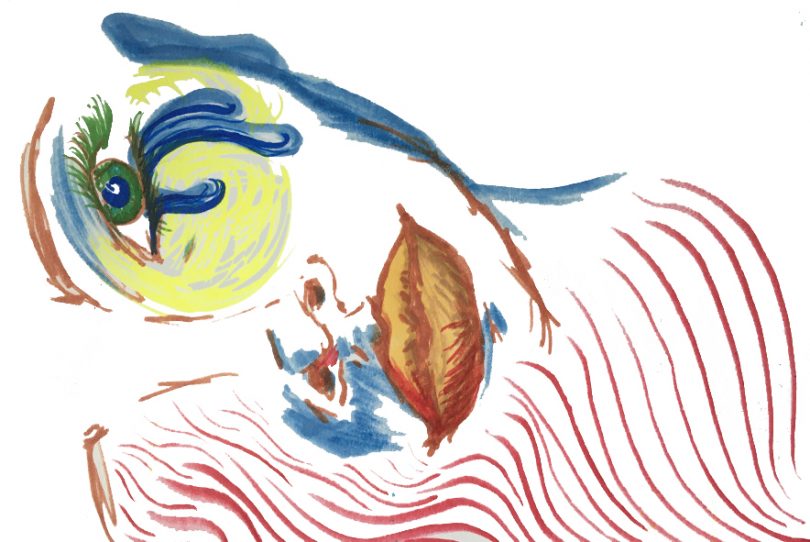Jess Hill on Reporting Domestic Abuse by ariellerichards
Warning – this interview references domestic abuse, family violence, child abuse and trauma. Jess Hill on reporting domestic abuse – the limitations of language, the various challenges she faced, and how to tell these stories well.
Feature illustration by Arielle Richards
Warning, this article contains references to domestic abuse, family violence, child abuse and sexual assault.
The worldwide COVID-19 lockdown has compounded the threat of domestic abuse, propelling reports of escalating household situations and disquieting silences from vulnerable households into the mainstream media.
Like the virus, domestic abuse and its many forms do not discriminate between location, race or socio-economic status – although some groups are more vulnerable, no one is immune.
Domestic abuse has become a prominent story in this lockdown, as the conditions provided by mandatory social isolation are a perfectly manufactured climate for coercive control to thrive.
The issue has had a long and suppressed history in this country and its recent appearances in mainstream media are frequently careless, harmful, knee-jerk reactions to an unthinkable tragedy.

Jess Hill is an investigative journalist who has been writing about domestic abuse since 2014. Photo by Connie Agius (supplied).
Jess Hill, an investigative journalist whose work on domestic abuse has won two Walkley Awards and the 2020 Stella Prize, said journalists need to continue investigating and reporting on cases of domestic abuse, not just at the “pointy end” of violence, but across the vastly dynamic and deeply personal spectrum of experience for both victim-survivors and perpetrators.
“It’s the work that I think is so important for us as a population that has various intergenerational traumas, woven through our experiences,” she said.
And I think the more that we can articulate our backgrounds, the difficulties in our lives, our abuses, our traumas, the better we are at being able to confront and change our narratives for the better.”
In Australia, one woman is murdered every week on average at the hands of a man known to her, and one child is killed by a parent almost every two weeks.
Counting Dead Women, an awareness campaign run by feminist activism group Destroy the Joint, has counted 13 murdered women in Australia as of April – this year’s list already shows a disturbing percentage of those murders took place in the victim’s homes.
Jenna Price, an academic and regular columnist for the Sydney Morning Herald, who has reported on family violence for 40 years, said she has seen a big shift in the way that journalists cover domestic violence.
“When I was a young reporter, we didn’t get to write about domestic violence,” she said.
“We would be having long conversations with editors who would say, ‘oh well that doesn’t happen to our readers’, so for me it’s a huge improvement. Now, senior editors recognise that domestic violence is a problem for Australians across all socioeconomic groups, in all locations.”
In a 2015 study, the Australian National Research Organisation for Womens Safety found a clear link between media reporting and shaping attitudes and beliefs towards violence against women.

Journalists need to report on domestic abuse well, with compassion and fairness. Illustration by Arielle Richards.
The study found high incidents of victim-blaming language, a lack of information for readers seeking help, and little information about the perpetrators, which rendered them largely “invisible”.
Since the study, the standard of domestic abuse reporting has improved, but Price thinks journalists can still go “a long way towards” changing the conversation.
“There’s more of an understanding that it’s an endemic problem, it’s not just about specific incidents, so we see it as a societal issue rather than the fault of an individual person,” she said.
“I think we’re on the right trajectory, honestly when I consider how terribly domestic violence used to be reported in Australia, I think we’ve come a long way.”
Jess Hill said it was crucial for journalists to report on domestic abuse mindfully, with compassion and fairness, as abuse can function and manifest in many different ways.
The more we understand it, the better we can overcome it, she said, and greater visibility of the issue would remind victims they are not alone.
“They can see that this is a phenomenon, that it affects millions and millions of people around the world, and that it has very similar impacts on people, and that actually coping and surviving is an incredible, heroic thing.”
1800RESPECT
1800 737 732
24 hour national sexual assault, family and domestic violence counselling line for any Australian who has experienced, or is at risk of, family and domestic violence and/or sexual assault.
Call toll-free 1800 737 732.
Kids Help Line
1800 551 800
Free, private and confidential, telephone and online counselling service specifically for young people aged between 5 and 25 in Australia.
Call 1800 551 800 for help
Lifeline
13 11 14
Lifeline has a national number who can help put you in contact with a crisis service in your state.
Anyone across Australia experiencing a personal crisis or thinking about suicide can call 13 11 14.

